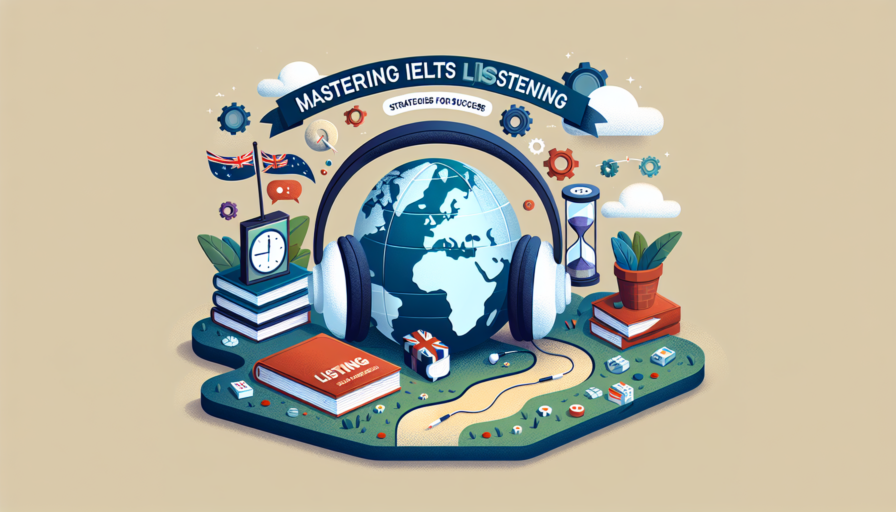
Contents
At Britannia School, we believe that grasping the IELTS Listening Test format is crucial for achieving a high score. This component of the IELTS examination assesses our ability to understand spoken English in various contexts. The test consists of four sections, each designed to challenge different listening skills through varied accents and topics.
The first section typically involves a conversation between two people, often situated in a social context. In the second section, we may hear a monologue, such as a speech or a talk about a general topic. The third section features a discussion among several speakers, perhaps in an educational setting, while the fourth section usually presents a lengthy academic talk. This structure helps us become accustomed to different levels of complexity and contexts in English.
Understanding the IELTS Listening Test format also requires us to recognize its timing and requirements. Each section lasts approximately 10 minutes, and we have the opportunity to read questions before the audio begins. At the end of the test, we are given 10 minutes to transfer our answers to the answer sheet. This allows us to ensure accuracy and gives us a chance to review our responses effectively.
At Britannia School, we understand the importance of effective listening practice in enhancing our communication skills. To cultivate our listening abilities, we can adopt several strategies that not only make us better listeners but also improve our comprehension and retention of information. Here are some essential techniques that we can integrate into our daily routines:
Moreover, we can engage in active conversations instead of passive listening. This means asking questions to clarify our understanding and summarizing main ideas to ensure we grasp the content fully. By applying these strategies, we will enhance our overall effective listening practice and foster collaborative learning experiences.
When preparing for the IELTS exam, we often encounter specific challenges in IELTS listening that can hinder our performance. One major obstacle is the varied accents of the speakers. IELTS Listening passages feature a range of English accents, such as British, American, Australian, and Canadian, making it crucial for us to acclimatize to these differences. To overcome this, we can regularly listen to podcasts, news broadcasts, and audiobooks in different accents, allowing us to familiarize ourselves with the nuances of pronunciation.
Another common challenge is the tendency to miss answers while juggling the flow of information. The recordings are only played once, and if we focus too much on writing down one answer, we risk missing subsequent pieces of information. To address this, we should practice note-taking strategies that enable us to jot down keywords or phrases. During our mock tests, we can train ourselves to listen for main ideas rather than getting caught up in every word, thereby improving our overall comprehension.
Additionally, interpreting the question types in the IELTS listening section can be daunting. Questions can range from multiple choice to sentence completion, and each requires a different listening strategy. We can enhance our skills by categorizing these question types during our practice sessions. By focusing on specific techniques for each type, such as predicting answers for multiple-choice questions or understanding the context for fill-in-the-blank exercises, we can boost our confidence and improve our accuracy.
Lastly, time management in the IELTS listening test is essential. We may feel rushed or anxious as we transition between questions. To combat this, we should practice under timed conditions, ensuring we develop a rhythm for moving between questions efficiently. By simulating real test conditions, we can build our stamina and familiarity, which will help us maintain calmness and focus on the test day.
When preparing for the IELTS exam, one of the key sections that we must focus on is the listening component. Mastering the IELTS Listening test requires us to engage with a variety of resources that enhance our skills and boost our confidence. Below, we will explore some of the top resources and tools that can help us achieve exceptional results in this crucial area.
In addition to these resources, utilizing IELTS Listening practice tests available online can significantly boost our experience. Websites dedicated to IELTS preparation often feature downloadable resources that simulate the exam environment, allowing us to practice effectively and track our progress. By integrating these tools into our study routine, we position ourselves for success in mastering the IELTS Listening section.
At Britannia School, we understand that mastering the IELTS Listening test requires more than just theoretical knowledge; it necessitates practical experience. One effective way to achieve this is by immersing ourselves in real-life scenarios that closely mimic the listening portion of the IELTS exam. By doing so, we can enhance our listening skills and develop a keen ear for different accents and conversation styles.
To benefit from our practice tests, we recommend incorporating various formats that reflect actual test conditions. Below are some recommended real-life scenarios we can practice with:
By routinely practicing with these real-life scenarios, we can build our confidence and familiarity with the types of questions that appear in the IELTS Listening test. This approach not only sharpens our listening skills but also prepares us mentally for the test-day experience, ensuring we perform at our best when it counts the most.